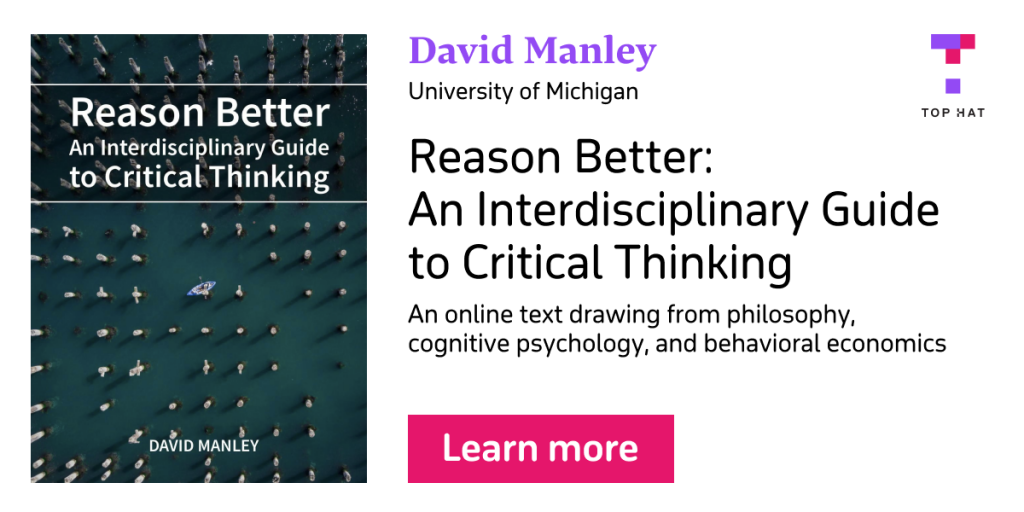Epistemic Humility, Ideological Mercy, Legitimation, and Disagreement
“the whiplash of (rather quickly) moving from an intensely conservative, fundamentalist world into a progressive, academic world… taught me two things…”
That’s Robin Dembroff, assistant professor of philosophy at Yale University, in an interview at What Is It Like To Be A Philosopher? They continue:
First, it taught me epistemic humility. Much of what I believed as a kid and even as a teenager, I now strongly disavow. I try to keep this in mind when doing philosophy: some of the things I felt most sure about were pulled out from under me once—it might happen again. That awareness makes me more pluralist in my thought, more cautious to make sweeping claims, and more open to alternative perspectives, regardless of the philosophical issue…
The second thing it taught me is what you might call ‘ideological mercy’. There can be a tendency to forget that people’s opinions have origin stories, and they often developed through rigorous socialization. We jump to read someone’s opinions as the ‘tea leaves’ of their character. Don’t get me wrong: sometimes, this is entirely appropriate. Some people have had access to all the evidence they need to revise prejudicial beliefs, and either ignore or avoid that evidence. But not always. One of the things I strive to do in my work—both in my public and academic philosophy—is meet people where they are coming from. I try to show that I understand ideas from the inside before I criticize them from the outside, and to avoid what I think are somewhat elitist dismissals of ‘folk concepts’ of gender, race, and other social categories.
Interviewer Clifford Sosis asks, “Do you worry about legitimizing views that are ‘beyond the pale’ by engaging them?” Dembroff replies:
I worry about this all the time. But in my view, largely inspired by Elizabeth Barnes’s brilliant (and I think correct) article in the Chronicle of Higher Ed on the issue, when to stop engaging with certain views largely depends on an empirical question: how widely are those views endorsed? When a destructive view is widely held, we don’t have the luxury of ignoring it, regardless of how beyond the pale it may be. Take anti-trans and anti-queer views. I don’t enjoy engaging those views. But these views proliferate, and are used to justify horrific treatment of trans and queer people. Given the situation, telling me to ‘not legitimize’ such views falls flat on my ears. Those views are legitimized. They are wreaking irreparable damage to people’s lives. I suspect that anyone who worries about ‘legitimizing’ those views doesn’t deal on a daily basis with their effects…
I think philosophers have a tendency to forget that our words have audiences, and aren’t spoken into a vacuum. What we say is not all that matters: it also matters how and where we say it. For one, I don’t engage on these issues on public social media, as I don’t think those conversations change minds; they tend to cocoon people deeper into their silos. I have had very productive conversations on private social media: just the other day, I had someone message me on Instagram to tell me that ‘God made me a woman and nothing would change that’. I asked them a bunch of questions about what they meant by ‘gender’ and ‘woman’, and why they thought it was important to say what they did. They came away admitting that they needed to be more careful about what they say. Having those conversations is taxing and time-consuming, but I think they are conversations that we need to have.
Sosis asks, “How does one who is trying to talk to everybody, avoid being ostracized or worse by people who think they shouldn’t?” Here’s Dembroff:
It’s impossible to not be ostracized by people who find it necessary to ostracize anyone who disagrees with them. I don’t think that can be avoided, because no matter where you go, be it right, left, or in-between, you can find fundamentalism. I was raised deep in the bowels of Evangelical fundamentalism. I can smell fundamentalism a mile away, and I want nothing to do with it. It’s reductive, and it lacks mercy and humility. The goal of my work is to step outside of fundamentalisms and scrutinize them; if that causes me to be ostracized, so be it.
Dembroff has insightful things to say about the current heated online disputes between some philosophers over issues related to transgender persons and their history, and shares their fascinating work on the metaphysics and politics of gender.
Read the whole thing.




http://www.patreon.com/whatisitliketobeaphilosopher